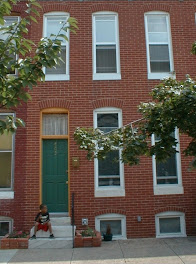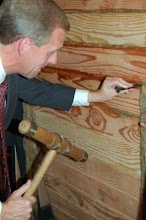By: Alicia Schuller, Marketing Coordinator, NHS of Baltimore
If you are not native to Baltimore, the term ground rent probably doesn’t mean a whole lot to you. If you are a renter, it most likely doesn’t mean a whole lot more. However if you are considering buying a home in Charm City, the term just became something you should familiarize yourself with. Although it does not apply to all homes in Baltimore, ground rent can play a role in determining the cost of escrow on your home and could possibly create problems for you in the future if you are unaware of how to deal with it.
A remnant of the colonial area, ground rents were once used as a way to cut down on the cost of homeownership for people, allowing them to rent the land on which their house stood, at a cheaper cost than buying it. Believe it or not, this old world way of doing business is still alive and well today in Baltimore city. The notion that you own your home does not necessarily imply that you own the land beneath it. Up until 2007, people who didn’t pay their ground rent could be ousted from their homes by the owners of the ground, who then had the right to seize and sell the home. This was often times happening for extremely small amounts of money as low as $24.
Many homeowners were not even aware that a ground rent existed on their property and others had a hard time finding the owners. According to the Baltimore Sun, large real estate developers were most commonly buying up the ground rents in pools and then requiring unpaid rent to be paid in full after years of neglect.
In 2007 Baltimore city passed several new ordinances regarding ground rents in order to protect and empower homeowners. If you own or are planning to purchase a home in the city, you should be aware of ground rent and your rights and responsibilities as they apply. (the following information comes from Live Baltimore’s website. If you would like to learn more, click here.)
•Ground rent is paid twice a year to the owner of the ground, or can be paid one time a year in full
•The cost associated with ground rent typically ranges from $50- $150
•When a property is listed for sale on the “Multiple Listing Service,” the property description should note if ground rent is applicable. Fee Simple means you’ll own the house and the ground when paying the purchase price. Ground Rent means you’ll pay a fee to the owner of the ground
•If you still do not know if ground rent applies to your property, you may visit the Maryland Department of Assessment and Taxation Database before September 30, 2010. All ground owners are now required to register with the database
•The most back ground rent that can be collected is 3 years, regardless of the amount of time unpaid
•You are entitled to buy your ground rent from the owner
•If you cannot afford to buy your ground rent, the Maryland Department of Housing and Community Development offers a loan to allow you to do so, although you must reside below 80% of the area median income (AMI)
skip to main |
skip to sidebar
+for+blog.jpg)
.JPG)
.jpg)
Baltimore boy enjoys the day on his front step

.JPG)
Potential homeowners attend our Homebuyer Education Class
.JPG)
Executive Director, Felix Torres Colon accepts governor's committment to excellence award

Board Chair, Ron Huffman helps seal the foundation of homeownership
Helping you endure these trying times by offering vital tips and information about homeownership and financial fitness.
FACING FORECLOSURE?
We can help. NHS of Baltimore is one of the leading foreclosure prevention nonprofits in the Baltimore region. We offer HUD certified counseling, loan modification mediation and refinancing. Get help today! 410-327-1200
NHS of Baltimore Website
Take our Homebuyer Education Class Online!
+for+blog.jpg)
- Neighborhood Housing Services of Baltimore Inc.
- For more information on our homebuyer education classes, foreclosure prevention, or to donate, please visit our website or call, 410-327-1200.
Blog Archive
-
▼
2009
(98)
-
▼
June
(13)
- NeighborWorks America and Member Organizations Inc...
- How House Plants Can Improve Your Indoor Living En...
- Photos from NeighborWorks Week 2009- neighborhood ...
- How to Sell Your Home During a Recession
- How Homeowners Can Combat Blight and Crime Brought...
- NHS of Baltimore Warns of Rising Housing Discrimin...
- Street Trees: Why They Benefit You as a Homeowner ...
- PRESS RELEASE: NHS to Host Free Homebuyer Educatio...
- More Money Available to First Time Homebuyers!
- NHS and Park Heights Residents Brighten Up Park Ci...
- NHS Provides the Tools for Successful Homeownershi...
- Be Green: 6 Simple Ways to Cut Down on Your Energy...
- Ground Rent: Know Your Rights and Responsibilities
-
▼
June
(13)
.jpg)
Baltimore boy enjoys the day on his front step

Potential homeowners attend our Homebuyer Education Class
Executive Director, Felix Torres Colon accepts governor's committment to excellence award
Board Chair, Ron Huffman helps seal the foundation of homeownership



